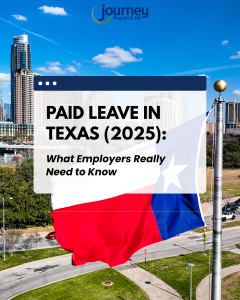Texas is famously “light” on statewide leave mandates, which makes policy design feel simpler, until you have multi-state teams. Here’s the plain-English rundown.
 No statewide paid sick leave or PFML.
No statewide paid sick leave or PFML.
Texas doesn’t require private employers to provide paid sick leave or a state paid family & medical leave program. Local sick-leave ordinances were largely stalled or preempted, and the 2023 “HB 2127” preemption law has seen courtroom challenges, net result: no active city mandates you can rely on as of 2025.
A voluntary parental-leave insurance exists but adoption is low.
Since 2023, carriers can offer group family leave insurance that an employer may choose to buy; it’s not a state fund and not required. Uptake has been limited so far.
What’s changing quietly in 2025.
While no new statewide mandates have passed, several trends are shaping employer practices. Texas-based employers with federal contracts or large remote teams are increasingly aligning with federal contractor requirements and the emerging patchwork of PFML programs in other states (like Colorado and Oregon). Many are expanding “flex” PTO banks or adding unpaid caregiving leave to stay competitive and compliant across borders. Additionally, enforcement of pregnancy and postpartum accommodation rules under the federal Pregnant Workers Fairness Act is prompting policy updates, especially for smaller businesses without formal HR infrastructure.
What smart Texas employers do:
-
Make PTO/sick clearly usable for illness and caregiving.
-
Offer short, documented parental leave (even if unpaid + PTO top-ups).
-
Train managers on FMLA, ADA, and pregnancy accommodation intersections.
Next Steps: Want a Texas-ready leave setup? Journey Payroll & HR can align PTO codes, manager workflows, and payroll deductions with your policy (and your other states) so everything runs clean.